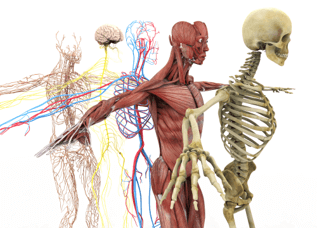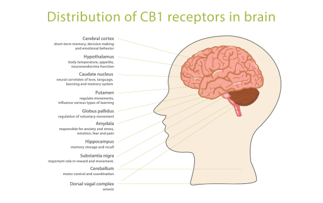How the Endocannabinoid System Works

Humans have been getting high from cannabis consumption for millennia, but only recently have researchers managed to understand how. Every person — in fact, every animal — has a system within them to which cannabis compounds gravitate toward, and the binding of cannabis molecules to that system results in various psychoactive and non-psychoactive effects. Discovered in the 1990s in the midst of cannabis research, that system has been dubbed the endogenous cannabinoid system (ECS) thanks to its critical role in interacting with cannabis, but as it turns out, the ECS does so much more than weed.
What Is the ECS
As researchers learn more about the ECS, they are discovering that the ECS is tied to almost every single other bodily system. Though it is most strongly linked to the central nervous system, the ECS also works with the digestive system, the circulatory system, the reproductive system, the endocrine system and the immune system, and there is some evidence that it affects the integumentary system, or the system affecting skin, nails and hair, as well.
The reason the ECS is connected to so much of the human body is that the ECS is responsible for maintaining homeostasis, or internal balance despite external change. As the environment around the human body changes, and as the human body endures different challenges, the ECS helps keep various systems functioning as they should. It does this by sending messages about different systems to the brain and adjusting levels of certain compounds it creates — compounds called endocannabinoids. Endocannabinoids can have many effects, such as:
- The regulation of temperature
- The formation of memories
- The stimulation of appetite
- The promotion of sleep
- The transportation of energy
- The release of stress hormones
- The activation of disease-fighting cells
- The regulation of female fertility
- The reception and communication of pain
In truth, there is still plenty that researchers don't understand about the ECS. Effective study has found the ECS in animals; in fact it seems that every vertebrate has an ECS, which indicates that the ECS is among the oldest and most fundamental systems in advanced life forms. It is possible that research into cannabis has led researchers to discover a system that could have wide-ranging impacts on medical knowledge forevermore.
How Does the ECS Use Cannabinoids

Researchers have identified two types of receptors associated with the ECS: EC1 receptors, which are primarily in the brain and digestive system, and EC2 receptors, which are scattered elsewhere throughout the body. Endocannabinoids, the compounds produced by the ECS, bind to these receptors to effect change.
However, endocannabinoids are not the only compounds that can bind to ECS receptors. Tetrahydrocannabinol, or THC, has a similar structure to an endocannabinoid called anandamide, which is sometimes called “the bliss molecule.” As a result, THC can fit neatly into the same EC1 receptors that anandamide does, and it can trigger the same effects, namely euphoria, stress relief, hunger and the like. However, because THC enters the body in much greater quantities than anandamide is ever produced, these effects tend to be much stronger with cannabis consumption, and if the body mismanages THC, the effects can easily become overwhelming.
The manner in which other cannabinoids interact with the ECS is less obvious. Researchers once believed that cannabidiol, or CBD, bound to EC2 receptors in muscles and other peripheral tissues, which is why the compound does not have a psychoactive effect. However, further research has shown that CBD doesn't bind to the ECS at all; instead, it seems to influence the ECS to generate more of certain endocannabinoids. Thus, CBD improves the body's ability to heal itself, potentially making it a true wonder drug. If other cannabinoids have similar impact as CBD, future medications could be much more impactful while also becoming much safer for patients to use.
Knowing a bit more about the ECS can help you make better decisions regarding your cannabis consumption. Whether you have a medical marijuana card or are a recreational user, you can take your knowledge of the ECS to a DC dispensary and ask budtenders for products that better suit your needs. With the right cannabis products, the right consumption habits and the right attitude, you can work with your ECS to experience improved wellness and a safe, fun cannabis experience.
839GYLCCC1992



Leave a Reply